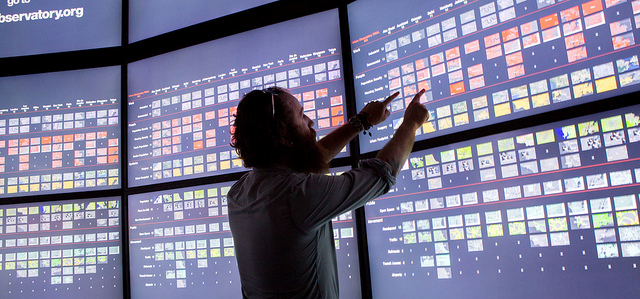Here’s what we seem to know about the idea of “Big Data” at this point:
- More or less, it might be “the future.”
- Despite it being the “future,” we don’t seem to be teaching it enough yet for the next generation to really understand how to use it.
- The C-Suite seems to want it, but they don’t know exactly what to do with it.
- Famous people like Ron Johnson (associated with the Apple Store as a concept) and Stephen Dubner (Freakonomics) have challenged it.
- The whole reason it’s not yet a major wave is because people aren’t 100 percent sure it’s associated with the bottom line.
If you look at the idea of “Big Data” as simply as possible, it comes down to this value proposition: for years, people made decisions based off gut/intellect/past experience, and those decisions (for better or worse) drove the growth of the company in question. Now there’s a whole slew of information at our fingertips about what our customers are doing, what they’re looking for, how they’re spending time … and that’s supposed to make decisions quicker and more direct, with a focus on what really matters.
But, uh, what if that doesn’t happen?
I was thinking about this while reading a bunch of articles as I was in Europe this past week — on trains and planes and whatnot, because I’m a totally sanctimonious fuck — and here’s something that concerns me:
- People don’t really know the difference between “analysis” and “synthesis.” Phrased simply, analysis is when you take info and break it down. Synthesis is when you take a series of information and build it up (into a bigger picture). People often view the words as synonyms, which isn’t correct.
- Companies aren’t really embracing Big Data yet: They don’t know what to do with it. They don’t have the right people to figure out what to do. It requires a culture change. The sheer amount of information can seem overwhelming. As such, adoption is slow.
- People love to be busy, but not necessarily productive: This is the currency of the modern world.
So think about a standard organization now, i.e. one that sells widgets or whatever the case may be. Suddenly, they have reams of data on what’s happening with their widgets: in stores, on Amazon, on their website, etc. But their team in marketing — where only 2.3 percent of resources are going towards data analysis and metrics anyway — is geared towards analyzing (remember: breaking down) information, not synthesizing (remember: putting together) the same data points. While the human brain can certainly adapt from Task A to Task B, it takes time. There’s a slow-down.
Reams of information also means reams of ways you can look at it (for an example of this, look at any fucking political discussion ever; two people with different backgrounds see the same facts and come at them in massively different ways). That means meetings become “Well, the data looks to be saying this… but maybe it’s saying this?” Because no one is totally sure, there’s a slow-down.
As you can see in the Dubner link above too, there’s a whole basic notion of human existence where (a) it’s hard for people to change how they think about making decisions and (b) people like to believe their intuition has some value to it. As a result, executives will seem reams of data — remember, executives are the same people who believe they’re “too busy to show respect” — and, because it’s not tied to making money at that moment, they’ll say something political like “We need to deep dive this” or “Needs more thought.” That’s a slow-down.
Think about this, too: look at a situation where multiple points of data are coming in quickly and it needs to be processed quickly for an outcome. Some of the things you may come to are “Situation Room” (politics), TV production truck, newsroom, crisis center, etc. In each of those cases, the context of the place demands that type of response. So, the rules of a newsroom indicate that when a big story breaks, you go into over-drive and process everything you can. The rules of a standard organization that sell widgets? They allow it to be much slower in how it moves, even if it’s claiming to move quickly (as all businesses claim to). In a way, then, maybe you need to change the rules.
In these ways, then, the precise concept that began to develop as a more effective way to analyze behavior may, in fact, become a less effective way to do so — and wholly because of the limitations of the humans who need to work on the concept.

From experience, big data — conceptually or otherwise — isn’t the problem. The problem is comprised of too much bureaucracy in companies, which distracts people from actually doing real work (I’m thinking of everyday operational activities like how things get approved, internal HR systems, etc.) and lack of direction from so-called “leaders.”
In many cases, big data is like a Ferrari that sits in a garage. There’s all this capability and intellectual horsepower available, but the 2 obstacles mentioned above get in the way of actually using it. So many companies have “leaders” that give lip service to supposedly great ideas and lofty objectives, but they essentially do nothing to facilitate those things or do more to get in their own way.
There isn’t a shortage of data stewards — people who can successfully work with and understand big data — there is, however, a shortage of decision-makers who know how to lead effectively.